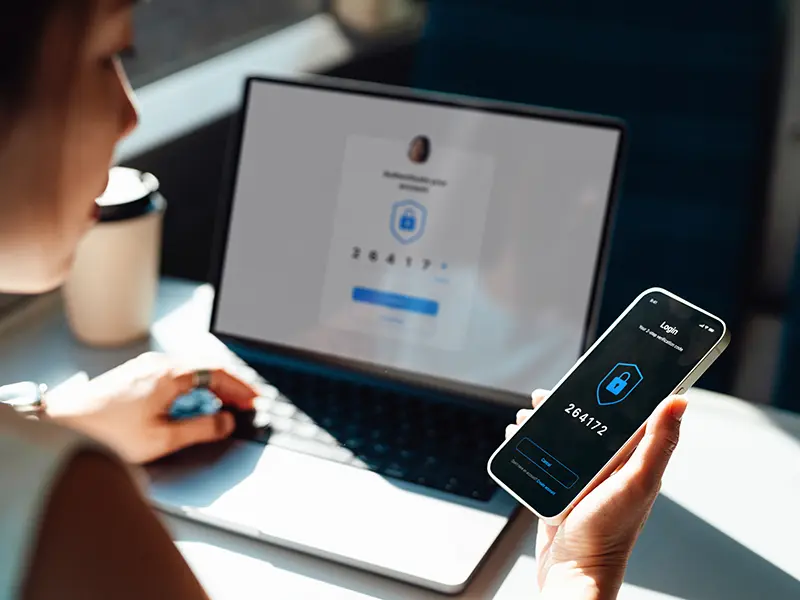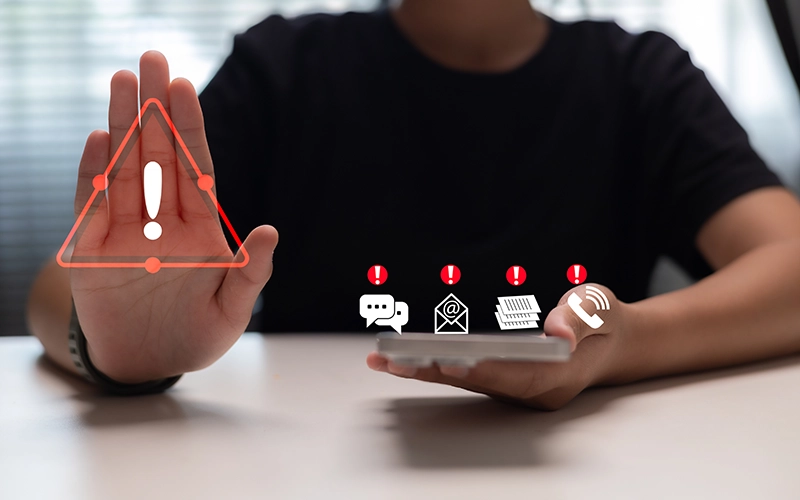Protect Your Identity
Fraud and scams are getting smarter every day, and victims are losing more money than ever. It's our goal to help you stay a step ahead. This page highlights the latest fraud trends and offers tips to keep your personal information safe.
Learn Straight from the Experts
The Federal Trade Commission (FTC) provides up-to-date info on scams, how they work, and even those trending in your area. Reporting fraud isn’t just about protecting yourself; it helps the entire community. If you’ve experienced fraud, consider filing a report with the FTC.


Red Flags and How to Avoid Fraud & Scams
Trust your instincts! If something feels off, it probably is. Watch out for these common warning signs:
- Pressure to act immediately
- Payment required with gift cards
- Upfront fees for a “free” prize or service
- Requests to overpay for an item and return the difference
- Asking for your online banking login credentials
- Instructions to wire money via Western Union or other methods
- Guaranteed investment returns or unusually high profits
Your Best Defense
Stay informed, double-check sources, and reach out to trusted financial professionals whenever something doesn’t feel right. Being cautious is the easiest way to protect your money and your identity.Common Scams
Online Loan Scams
How It Happens:
- The online payday lenders required borrowers to provide bank account information so they could deposit the borrowed funds electronically and withdraw the repayment amount from the account later.
- The lenders claimed that the repayment amount would be the amount borrowed plus a one-time finance fee, and that this amount would be withdrawn on a particular date.
- The lenders lie about how much their loans would cost. The result of this scheme? The borrowers paid much more than the stated cost of their loans.
Fake Check Scams
Mystery Shoppers- Scammers pretend to hire people as mystery shoppers and tell them their first assignment is to evaluate a retailer that sells gift cards, money orders, or a money transfer service, like Western Union or MoneyGram.
- The shopper gets a check with instructions to deposit it in a personal bank account and wire it to someone else. But once the money is wired, the person on the other end can disappear.
- As a way to earn extra cash, you find an offer to wrap your vehicle in an advertisement. To get started, the 'employer' will send you a check to cover your payment and also the cost of the wrap.
- You are then told to deposit checks and send money to decal installers. These installers don’t actually exist. You have sent money back to the fraudster and will not be able to retrieve it.
- eople apply online and get hired as personal assistants. They get a check and are told to use the money to buy gift cards or to buy equipment or supplies for their new client.
- Once the scammers get the gift card PIN numbers, they use them instantly, leaving the “personal assistant” without the money when the bank figures out the check is bad.
Tech Support "Team Viewer" Scams
How It Happens:
- Generally starts with a seemingly legitimate call from a software or computer company, or a pop-up on your computer.
- The caller or pop-up uses an excuse such as your computer has reported an issue, or you paid for this service and we are going to fix your computer.
- You grant this person access to your computer using legit software (usually called Team View).
- The person downloads a file onto your computer that contains malware. The malware contains a bug on your computer to track websites you visit such as financial institution or other personal websites. They then have software that will track keystrokes and can compromise usernames/passwords to access your banking sites, compromising the accounts and ripping you off.
Apple & Amazon Support Scam
How It Happens: Victims have reported multiple scenarios when getting scammed.Scenario #1- You’ll receive a ‘phishing’ email or phone call stating there is a problem with your Apple or Amazon account.
- The issue can be a number of things. An Apple email or phone call may state that you are owed a refund of some sort. An Amazon email or phone call may state that you have a lost package or issue with delivery.
- By clicking on the link, you are likely downloading malware onto your computer than may result in compromised personal information.
- Apple or Amazon states that you were refunded some money in error. Since the refund isn't yours, you need to pay it back. If you pay the refund back quickly, there would be no disruption or lockdown of your account or service. You don't see the credit yet, but if you don't pay right now, your account will be locked until the pending credit is paid off or backed out of the account.
- To "pay off" your refund, they will ask you to visit a website or call a phone number (or press 1 to speak with someone now). By paying, the scammer is receiving your money that you didn't actually owe. It could also compromise your card number or other payment information. There is no refund really coming.
"Waiting Package" Phishing Scam
How It Happens:- You will receive a text message, or possibly email, stating there is an issue delivering a package that you are expecting. Since most people do a lot of online shopping these days, they likely think it is a package that they forgot about.
- The link generally contains a piece of malware that will download to your device, giving hackers access to personal information that can compromise your personal, sensitive information.
Grandparent Scam
How It Happens:
- Targets older people who would be in the expected age of a grandparent, scammers will call and answer the phone similar to this: “Hi Grandma, do you know who this is?”
- As the victim tries to figure out who might be calling, if they do have grandkids they may guess a grandkids name.>
- This opens the door for the scammer to pretend to be that grandchild and makes a claim that they are in some sort of emergency or bad situation.
- They will ask for money to be sent to get them out of the situation and usually asks the grandparent to not tell their parents so they don’t get in trouble.
- Money will usually be sent via Western Union wire transfers so that it is untraceable and cannot be recovered.
- Rule of Thumb: Always ask the parent before sending money, even if it would get your grandchild in trouble. It’s better to have them safe and to confirm if it’s really them than to lose your money.
Romance Scam
How It Happens:
- Someone who is lonely will meet someone else on a dating app or social media network.
- They build trust over time (usually over a period of months, but sometimes over a year or more).
- Generally, the scammer will have a reason that the two can never meet – they live too far away, or have a job that requires a lot of travel, etc.)
- One day, the scammer claims that they need some money to get out of a situation or to help in a time of need.
- Because the relationship has ‘evolved’ into something more than a friendship, the victim will believe this to be a true need.
- The scammer manipulates victim into sending gift cards, or cashing a check and wiring money, or some other financial dealing.
- Once the victim sends the money, it usually cannot be recovered. The scammer then, no longer returns messages, etc. and goes about their life while the victim digs out of the financial loss.
Lottery Prize Winning Scam
This scam revolves around you winning a large sum of money. Usually, the scammer contacts you by phone or email and claims that you were automatically entered into some lottery or contest that you have never heard of. However, before claiming your prize, you must make a payment for taxes, a fee or some other form of "bill" so that they can credit your account. The scammer has you send the payment, however there is never any prize/winnings that come in return. You're out the money with no way of getting it back. Learn more about these lottery scams by visiting the FTC's website.Car Wrap Scam
The Car Wrap scam is very common and very simple. Oftentimes, it occurs when a consumer responds to a job posting on Craigslist or some other website from someone pretending to be a reputable company. The 'job' is to wrap your car in advertising and drive around town. To get you started, the 'company' offers to pay for you to wrap the car by sending you a check. You wrap the car and send them back the remaining cash in the form of gift cards. However, the check is fake and you're now responsible for the money that you received. Learn more about these car wrap scams by visiting the FTC's website.Overpaid Utility Bill Scam
Learn more about these utility scams by visiting the FTC's website.Unemployment Benefit Scam
Scammers took advantage of the Coronavirus pandemic in a number of ways. One significant issue has been the attempt of earning unemployment benefits illegitimately. It's possible that scammers may be receiving benefits in your name. If you feel as though this is happening, there are a few things you should do:- Report the fraud to your employer.
- Report the fraud to your state unemployment benefits agency.
- Visit IdentityTheft.gov to report the fraud to the FTC and get help with the next important recovery steps.
- Review your credit reports often.
How to Recover from Identity Theft
If you've been a victim of Identity Theft, report it immediately!
- Contact the Federal Trade Commission (FTC). Once filing the ID theft complaint with the FTC, you will have an affidavit assigned to you.
- Contact your local police department to file your ID theft complaint. Once filing the complaint with your local police department, you will get a police report.
- These two documents together are your Identity Theft Report and will aide you in resolving the issue.
- Notify the credit bureaus. By letting the credit bureaus know you have been a victim of fraud, they can add fraud alerts that make any business or financial entity verify you before they can open accounts, loans, etc.
- Experian: 1-888-397-3742 | www.experian.com
- Equifax: 1-800-685-1111 | www.equifax.com
- TransUnion: 1-800-888-4213 | www.transunion.com
Prevent Identity Theft
Take these pre-cautionary steps to protect your personal information:
- Do not share important personal or banking information unless you initiated the contact and trust who you are dealing with
- Pay attention to statements. Ensure all charges are what you authorized. If you see unauthorized transactions, notify your financial institution.
- Protect your online information. Create complex passwords that identity thieves cannot guess easily. Also install firewalls and virus-detection software on your home computer.
- Check your credit report annually. There are resources where you can view your credit report for free.
- Protect your paper information. Collect your mail promptly, store important documents securely and when disposing of important documents or cards, be sure to shred the information.
- Don't fall to common scams or unsolicited requests for personal information. Unexpected emails or calls from the IRS are typically a scam. Report these emails or calls immediately.